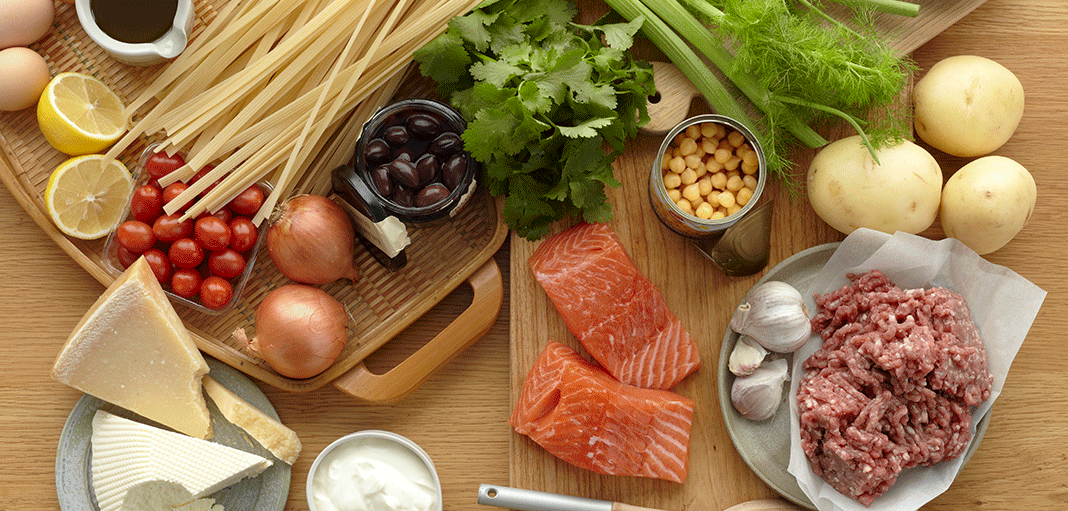Enroll with us in a few easy steps
Good nutrition is key for those living with cystic fibrosis (CF). This means:
- Eating a balanced diet
- Getting enough calories
- Drinking plenty of fluids
Eating a balanced diet
In general, people with CF need 30 to 50 percent more calories daily than others in their age group.1 Also, 85 to 90 percent of those with CF have pancreatic insufficiency.2 This happens when the mucus builds up and affects the pancreas. The pancreas is an organ that helps digest food.
Your eating plan may include:3
- Protein: This should make up about 15 to 20 percent of your calories a day. Protein helps build strong muscles. These include meats and fish, eggs, cheese, soy foods and nuts.
- Fats: Fatty foods are the richest source of calories. Each one gram of fat has nine calories. People with CF should get 35 to 40 percent of their intake from fat. Fat is also a good source of essential fatty acids and fat-soluble vitamins like vitamin A. Choose “good” unsaturated fats when you can. Try olive, corn, soy and sunflower oils. Try these tips to get more fat in your diet:
- Add butter or olive oil to vegetables or over pasta
- Eat chocolate or add whipped cream to puddings and pies
- Always use full fat dressings
- Carbohydrates: These are another good source of calories. They can be found in cereals, breads and pastas. Choose pastas made with whole wheat and extra omega-3 fatty acids. Boost your calories by adding dried fruits, whole milk to cereals and nuts.
- Calcium: CF puts you at risk for having osteoporosis (weak, brittle bones). Eat more foods with dairy to lower your risk. Look for dairy that’s high in fat. Good choices are cream and fruit juices with added calcium.
- Essential fatty acids: These are often referred to as omega-3 and omega-6 fatty acids, Essential fatty acids are often found in fish oils. They are shown to help develop the brain. They are also good for overall growth. Try salmon and flaxseed oil.
- Fat-soluble vitamins (A, D, E and K): These help promote good eyesight, healthy bones and growth. They help with blood clotting and making red blood cells. CF prevents the body from absorbing these vitamins. You can add these to your diet with a vitamin supplement made just for CF.
- Iron: Iron helps to fight infection. It also carries oxygen to cells throughout the body. You can get iron by eating meats, cereals, dried fruits and dark green leafy vegetables.
- Zinc: This helps with growth, healing and fighting infection. You can boost zinc in your diet by eating meats, eggs and seafood. Zinc is also found in many multivitamin supplements.
Staying hydrated
Getting plenty of fluids is good for managing CF. Staying hydrated keeps mucus thinner. It also helps food move along in your gut. With CF, you may not always feel thirsty. That’s because CF makes you lose more salt. Know the signs when your body is dehydrated. You may feel tired, dizzy, have headaches or muscle cramps.
Follow these tips to make sure your body gets what it needs:
- Eat more salt: Replace the salt you lose from sweating. This is especially important when you exercise. Add salt to your food, or eat salty snacks like pretzels, salted nuts and chips.
- Fill that bottle: Drink water throughout your day. Try keeping a full water bottle close by. In general, people should drink about 2 liters a day. Younger children may need about 1 to 1.7 liters a day. Talk to your doctor about how much fluid you should drink.
- Know your drinks: Drink water, milk and sports drinks. Avoid caffeine and alcohol. They can make your body lose fluids instead of hydrating you.
Getting enough calories
Many people with CF need to add dietary supplements to their daily diet. This is especially true for children. This helps make sure they get enough calories, protein and nutrients. For example, you can increase your calories by drinking nutritional shakes. You can make these at home or buy them at a store (such as Boost® or Ensure®).
Many children are picky eaters. Keeping up with calories can be hard if your child also has CF. Try eating meals as a family. Make mealtime a social and fun event. This provides structured time and encourages positive eating habits.
You may also need pancreatic enzymes. They help absorb nutrients from your diet.
Your eating plan should fit your needs. Work with your dietitian to find the diet and supplements that work best for you.
This information is not a substitute for medical advice or treatment. Talk to your doctor or health care provider about your medical condition and prior to starting any new treatment. CVS Specialty assumes no liability whatsoever for the information provided or for any diagnosis or treatment made as a result, nor is it responsible for the reliability of the content.
CVS Specialty does not operate all the websites/organizations listed here, nor is it responsible for the availability or reliability of their content. These listings do not imply or constitute an endorsement, sponsorship, or recommendation by CVS Specialty.
Your privacy is important to us. Our employees are trained regarding the appropriate way to handle your private health information.
This page contains registered trademarks of entities not affiliated with CVS Specialty.
1 Cff.org. Feeding Your 12- to 24-Month-old with CF | Cystic Fibrosis Foundation. Accessed October 31, 2022.
2 Nih.gov. Pancreatic insufficiency in Cystic Fibrosis – PubMed. Accessed October 31, 2022.
3 For children younger than three years old, it is best to avoid nuts or nut-based products due to the increased risk of developing allergies.

